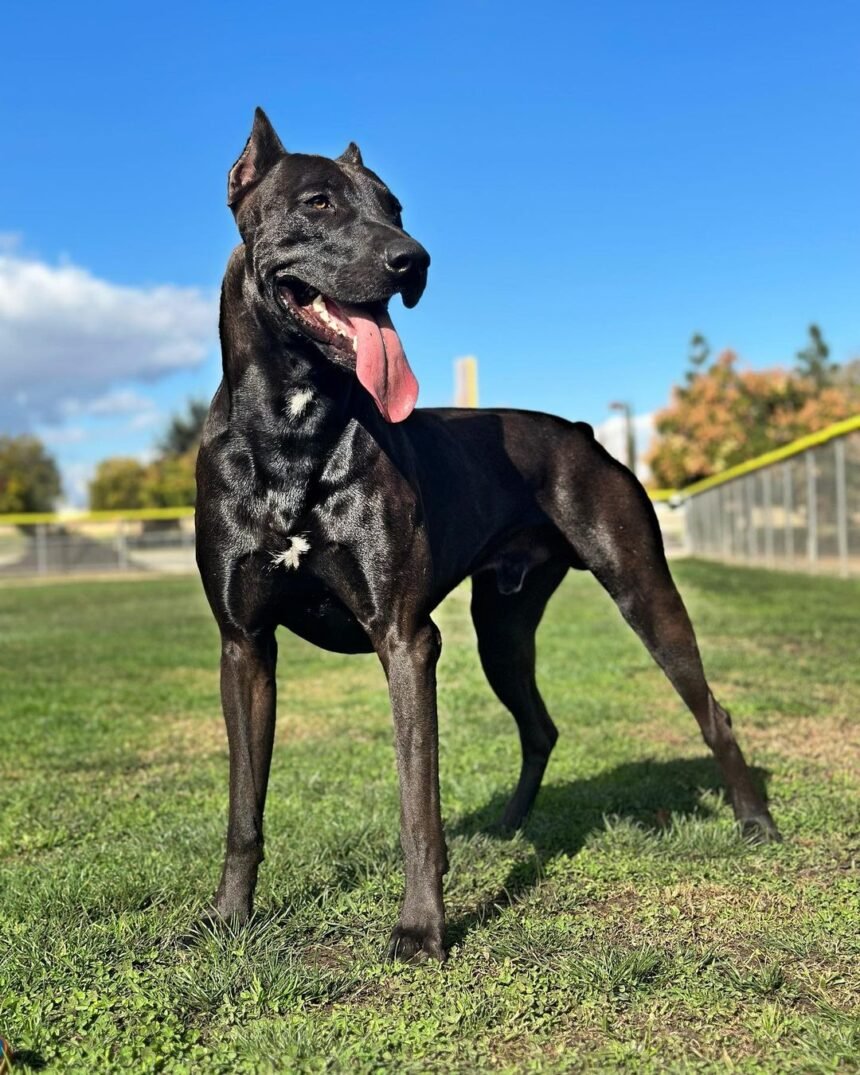Introducing the Canis Panther, a hidden gem in the world of dog breeds. While many people are familiar with popular and well-known breeds, such as Labradors or German Shepherds, there exists a fascinating world of unique and lesser-known breeds that often go unnoticed. The Canis Panther is one such breed that deserves our attention.
The Canis Panther is a powerful and majestic dog breed that combines strength, agility, and intelligence. With its striking appearance and muscular build, this breed commands attention wherever it goes. Originally bred for protection and guard work, these dogs possess an innate sense of loyalty and dedication to their families.
While the Canis Panther may not be as widely recognized as some other breeds, it is quickly gaining recognition among enthusiasts who appreciate its impressive qualities. This hidden gem offers not only physical prowess but also a gentle yet protective nature that makes them excellent companions for experienced dog owners.
With each passing day, more people are discovering the allure of this remarkable breed. From its sleek coat to its commanding presence, the Canis Panther truly stands out among the crowd of dog breeds. Whether you are seeking a devoted family pet or a loyal guardian for your home or property, this breed has much to offer.
The Origins and History of the Canis Panther

The Canis Panther, a magnificent and powerful breed, has a fascinating origin story that traces back to the world of hybrid dogs. Understanding the history and lineage of this remarkable breed provides valuable insight into its unique characteristics and qualities.
The Canis Panther’s history can be traced back to the 1970s when it was first developed by Mr. Scorpio Jones, a renowned American dog breeder. Inspired by his vision to create the ultimate protection dog with an impeccable temperament, strength, agility, and intelligence, Jones embarked on a journey that would lead to the creation of the Canis Panther.
To achieve his goal, Jones carefully selected specific breeds known for their exceptional qualities and blended them together through controlled breeding programs. The exact combination of breeds used in developing the Canis Panther remains closely guarded; however, it is believed to include breeds such as the Doberman Pinscher, Labrador Retriever, Staffordshire Bull Terrier, American Pit Bull Terrier, and Great Dane.
This meticulous selection process resulted in a breed that not only possessed an imposing appearance but also excelled in various working roles such as personal protection dogs and law enforcement canines. The Canis Panther quickly gained recognition for its versatility, loyalty, and impressive athletic abilities.
Appearance and Physical Characteristics of the Canis Panther

The Canis Panther is a remarkable breed known for its striking appearance and impressive physical characteristics. Its muscular build and powerful physique make it an imposing presence.
In terms of size and weight, the Canis Panther is considered a large breed. Males typically range from 100 to 140 pounds, while females are slightly smaller at 80 to 120 pounds. Their height can vary between 24 to 30 inches at the shoulder, giving them a commanding stature.
One of the distinguishing features of the Canis Panther is its coat color variations. These majestic dogs come in a range of colors including black, fawn, blue, brindle, and chocolate. Some individuals may have solid coats, while others display beautiful patterns or markings.
Whether it’s their robust muscle structure or their captivating coat colors, the Canis Panther certainly leaves a lasting impression. Their appearance embodies strength and elegance, making them a sought-after breed among dog enthusiasts worldwide.
Temperament and Personality Traits of a Canis Panther
When it comes to choosing a family-friendly dog, the temperament and personality traits of the Canis Panther make them an ideal choice. Known for their loyal companionship and protective instincts, these dogs are sure to become a cherished member of your household.
The Canis Panther’s temperament is often described as confident, intelligent, and highly trainable. They are known for their loyalty towards their families and will go to great lengths to protect them. With proper socialization and training, they can be friendly and gentle with children and other pets.
Their protective instincts make them excellent guard dogs, providing a sense of security to your home. They have a natural instinct to assess potential threats, making them vigilant watchdogs that will alert you if something seems amiss.
Despite their protective nature, Canis Panthers can also be loving and affectionate towards their families. They thrive on human companionship and enjoy being part of activities with their loved ones.
Overall, the temperament and personality traits of the Canis Panther make them an excellent choice for those seeking a loyal companion who can also provide protection when needed. Whether it’s playing with children or safeguarding your home, these remarkable dogs are sure to bring joy and peace of mind into your life.
Socializing Your Canine Companion: Interacting with Other Pets and People
Socializing your Canine Panther is essential for their overall well-being and happiness. As a responsible pet owner, it is important to provide them with opportunities to interact with other pets and people in a positive and controlled manner. This section will provide you with valuable tips on how to socialize your Canine Panther, whether it’s introducing them to other dogs or helping them behave appropriately in social situations.
When it comes to introducing your Canine Panther to other dogs, the key is gradual and supervised introductions. Start by arranging playdates with well-socialized dogs that are known for their friendly demeanor. Choose neutral territory for the first meeting, such as a park or a spacious backyard. Keep both dogs on leashes initially and allow them to sniff each other from a safe distance. Gradually decrease the distance between them while closely observing their body language. If any signs of aggression or discomfort arise, separate the dogs immediately and try again at a later time.
In addition to interactions with other pets, it’s equally important for your Canine Panther to be comfortable around new people. Begin by exposing them to different individuals in controlled environments. Start with family members or close friends who are familiar to your dog and gradually introduce strangers into the mix. Encourage positive associations by rewarding good behavior with treats or praise.
Training plays a crucial role in ensuring good behavior in social situations. Teach your Canine Panther basic obedience commands such as “sit,” “stay,” and “leave it.” These commands will not only help you control their behavior but also promote calmness and attentiveness when interacting with others.
Is the Canis Panthers Dog Breed Aggressive?

Canis Panthers are naturally protective of their families, which can sometimes be mistaken for aggression. However, this protective nature is typically directed towards perceived threats rather than unprovoked aggression. When well-socialized and properly trained, they can be well-mannered, loyal, and trustworthy companions.
To ensure that Canis Panthers are not aggressive and remain well-adjusted, early socialization is crucial. Exposing them to various people, animals, and environments helps them develop confidence and adaptability. Additionally, consistent and positive reinforcement-based training is essential in teaching them appropriate behavior and responses to various situations.
It’s important to note that any dog, regardless of breed, can exhibit aggressive behavior if not raised and trained properly. Responsible ownership, socialization, and training are key factors in shaping the temperament of Canis Panthers and ensuring they are not aggressive but rather protective and well-behaved companions.
Canis Panthers as Working Dogs
Canis Panthers have proven themselves to be incredibly versatile when it comes to their working abilities. These powerful and intelligent dogs excel in a variety of roles, making them highly sought after for various tasks.
One of the key roles that Canis Panthers are well-suited for is search and rescue. With their keen sense of smell, agility, and endurance, they are able to navigate through challenging terrains and locate missing individuals with remarkable accuracy. Their determination and drive make them ideal candidates for this demanding line of work.
In addition to search and rescue, Canis Panthers also excel as guard dogs. Their imposing presence combined with their natural protective instincts makes them an excellent choice for securing properties or individuals. Their loyalty and obedience make them highly trainable, allowing them to quickly adapt to different situations and respond accordingly.
Furthermore, Canis Panthers have proven to be exceptional therapy animals. Their calm demeanor and gentle nature make them well-suited for providing emotional support to individuals in need. Whether it’s in hospitals, nursing homes, or rehabilitation centers, these dogs bring comfort and joy to those they interact with.
Is a Canis Panther the Right Dog Breed for You?
Before deciding to bring a Canis Panther into your life, it is important to carefully consider a few key factors. These factors include your living arrangements and your commitment to providing regular exercise for this powerful breed.
Canis Panthers are large and strong dogs that require ample space to thrive. They are not well-suited for small apartments or homes with limited outdoor areas. Ideally, they should have access to a securely fenced yard where they can safely roam and play.
In addition to space requirements, the Canis Panther also demands a significant exercise commitment. This breed is highly energetic and needs daily physical activity to prevent boredom and maintain their overall well-being. Long walks, vigorous play sessions, and mental stimulation are essential for their happiness.
If you lead an active lifestyle and have the means to provide the necessary exercise and living environment for a Canis Panther, this breed can be a wonderful companion. However, if you are unable to meet these requirements, it may be best to consider other dog breeds that better align with your living situation and lifestyle.







